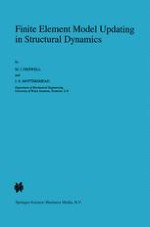1995 | OriginalPaper | Chapter
Iterative Methods using Modal Data
Authors : M. I. Friswell, J. E. Mottershead
Published in: Finite Element Model Updating in Structural Dynamics
Publisher: Springer Netherlands
Included in: Professional Book Archive
Activate our intelligent search to find suitable subject content or patents.
Select sections of text to find matching patents with Artificial Intelligence. powered by
Select sections of text to find additional relevant content using AI-assisted search. powered by
As with all model updating techniques, the objective of iterative methods using modal data is to improve the correlation between the measured data and the analytical model. The correlation is determined by a penalty function involving the mode shape and eigenvalue data: often the sum of squares of the difference between the measured and estimated eigenvalues is used. Because of the nature of this penalty function, the solution requires the problem to be linearised and optimised iteratively. These methods allow a wide choice of parameters to be updated and both the measured data and the initial analytical parameter estimates may be weighted. This ability to weight the different data sets gives the method its power and versatility, but requires engineering insight to provide the correct weights. The minimum variance algorithm is often used in commercial updating software.
